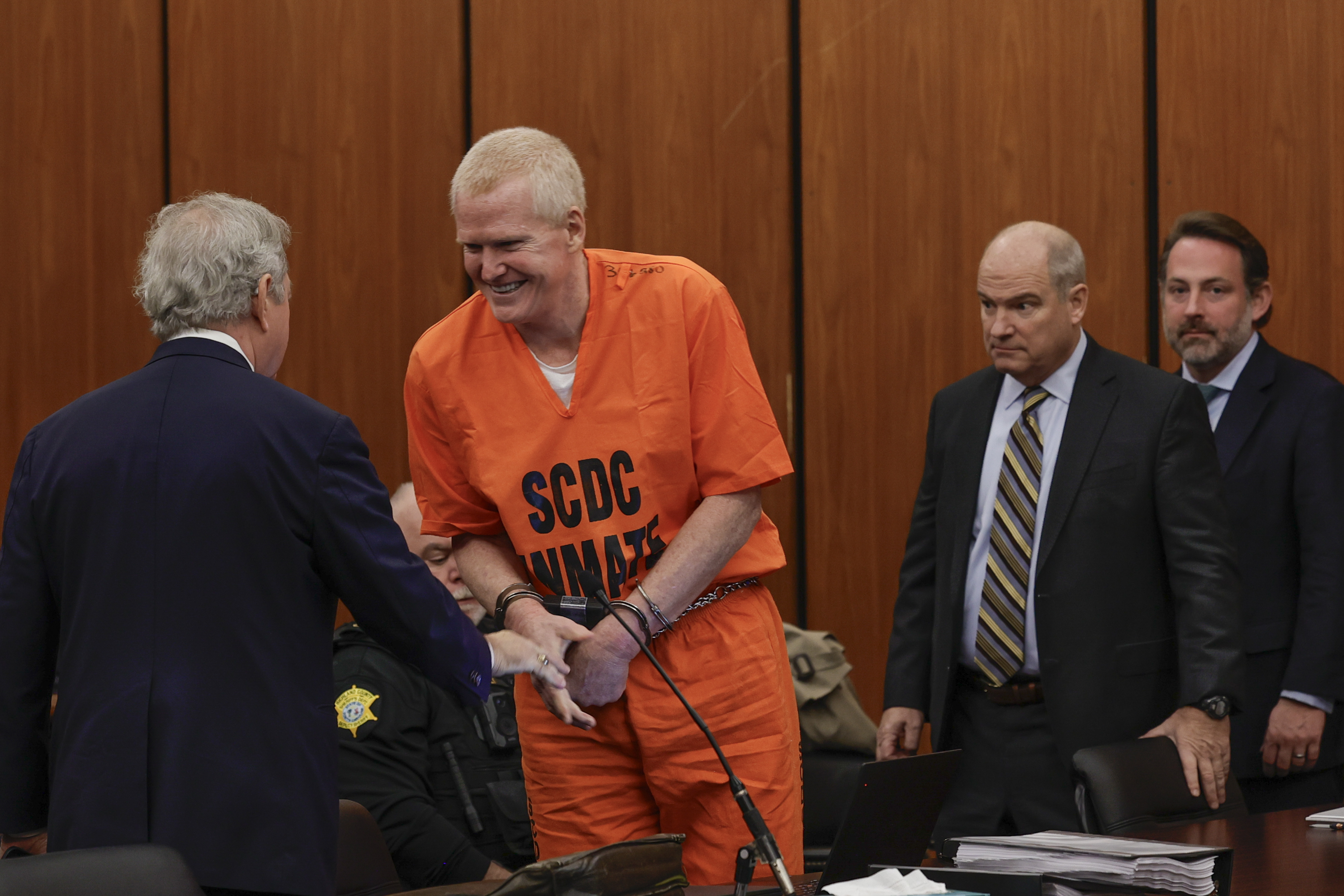Alex Murdaugh sentenced to 40 years for financial crimes

Alex Murdaugh, convicted of killing his wife, Maggie, and younger son, Paul, in June 2021, greets his attorney Jim Harpootlian before a hearing on a motion for a retrial on Jan. 16, 2024, at the Richland County Judicial Center in Columbia, S.C. (Tracy Glantz/The State via AP, Pool)
Convicted murderer Alex Murdaugh was sentenced in federal court on Monday to 40 years in prison for nearly two dozen financial crimes, 13 months after the former lawyer was found guilty of killing his wife and son.
Murdaugh, who is already serving two life sentences, pleaded guilty to 22 financial crimes in September. He admitted to laundering at least $6 million from clients he represented in court, according to federal court records. Murdaugh said during his live-streamed murder trial that bad land deals and his addiction to opiates created a decade-long cycle of borrowing and spending that left the family on a bad financial footing.
Prosecutors say they identified 25 victims of Murdaugh’s financial crimes, nearly half of whom did not want to relive their experiences in a courtroom.
“Murdaugh’s victims turned to him when they were particularly vulnerable, after suffering serious injuries and losing loved ones,” U.S. Attorney Adair F. Boroughs said in a statement to The Washington Post. “They put their trust in him as their lawyer, and he betrayed them. His crimes were cold, calculated, and brazen, and he earned every day of his 40-year sentence. We hope that it provides at least some closure to his victims.”
Murdaugh’s attorneys did not respond a request for comment.
South Carolina Attorney General Alan Wilson and prosecutor Creighton Waters praised the legal process after Alex Murdaugh received a guilty verdict on March 2. (The Washington Post)
The sentencing is the latest step in a long fall from grace for a once-powerful family.
Three generations of Murdaugh men served as elected prosecutors in South Carolina’s Lowcountry—a jurisdiction that came to be known to locals as “Murdaugh Country”—and created a legal dynasty that afforded them a charmed life.
Murdaugh was convicted last year of killing his wife, Maggie Murdaugh, 52, and son Paul Murdaugh, 22. They were shot June 7, 2021, on the family’s 1,772-acre rural Islandton hunting estate, known as Moselle. The property is about 50 miles from Charleston. (Murdaugh’s attorneys said at the murder trial’s start that no physical evidence tied him to the shootings, and he maintains his innocence in the slayings.)
The Murdaugh family case was widely publicized through not only news coverage but a Netflix series and podcasts in early 2023. The story was seemingly made to capture attention: the downfall of a powerful Southern family that also had the true-crime elements that can engage an insatiable audience.
In this trial, Murdaugh was tried for stealing settlements meant for clients, including the families of a quadriplegic man and of the housekeeper who helped raise Murdaugh’s children. He signed a plea deal admitting to state financial crimes in November, adding 27 years to his life sentence. He will serve his prison sentences for the state and federal crimes concurrently.
Prosecutors wrote in a sentencing memorandum that Murdaugh’s crimes occurred from September 2005 to September 2021: “Murdaugh spent more than fifteen years spinning a complex web of exploitation, manipulation, and deceit - preying on highly vulnerable victims in pursuit of his own personal gain.”
Murdaugh moved money through multiple avenues, prosecutors wrote. He drafted disbursement sheets that diverted settlement funds into his personal bank accounts; he wrongfully claimed funds that were held in the law firm’s trust as satisfying attorney fees; he claimed and collected attorney fees on fake annuities; he filed for expenses that never occurred, including medical, construction and airline expenses; and he intercepted insurance proceeds intended for beneficiaries and deposited them to his accounts.
Moving that much money around requires a banker, whom prosecutors say Murdaugh had in Russell Laffitte, who collected $350,000 in fees to handle the attorney money. In August, Laffitte was sentenced to seven years in prison on federal fraud charges. Murdaugh also had the assistance of former lawyer Cory Fleming, who was sentenced in August to 46 months in federal prison for his role helping Murdaugh bilk the family of Gloria Satterfield.
Satterfield was a longtime housekeeper to the Murdaugh family and died in a fall in 2018 while working at Moselle. Her sons were set to receive $4.3 million in insurance settlement funds, but Murdaugh admitted to stealing much of the money. “You lied, you cheated, you stole,” one of her sons, Tony Satterfield, said during the state financial crimes trial. “I will pray for you every day.”
Ginger Hadwin, the deceased’s sister, also addressed Murdaugh during the state trial: “They lost a mother, and you stole every dime from them,” she said. “And I just don’t understand. Did you not have a soul? I don’t get it.”
In addition, Murdaugh represented the family of Hakeem Pinckney, who became a quadriplegic after a car crash, after Pinckney died. But Murdaugh stole settlement money from the family, some of which he and others used to charter flights to the college baseball World Series, according to prosecutors.
Pinckney’s mother, Pamela Pinckney, addressed Murdaugh during the state trial: “I never thought that you would betray me and my family the way [you] did.”



